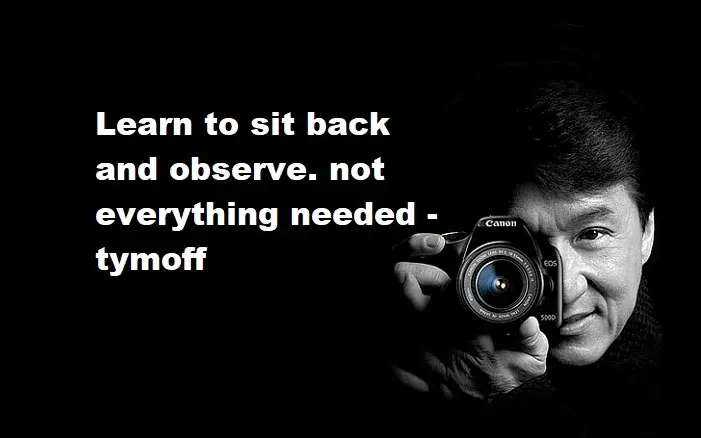Learn to Sit Back and Observe. Not Everything Need – tymoff is a skill often overlooked in today’s fast-paced world. In a society that values action and productivity, the idea of simply observing can seem counterintuitive. However, taking the time to observe can offer numerous benefits, both personally and professionally. In this article, we’ll explore the importance of learning to sit back and observe, and how it can positively impact various aspects of our lives.
Understanding the Art Learn to Sit Back and Observe. Not Everything Need – tymoff
Learn to Sit Back and Observe. Not Everything Need – tymoff is more than just seeing; it’s about actively paying attention to the world around us. When we observe, we engage our senses fully, taking in not only what is visible but also what is not immediately apparent. It involves being present in the moment, tuning in to details, and noticing patterns and nuances that may go unnoticed by others. The art of observation is a skill that can be cultivated and refined over time through practice and mindfulness.
Cultivating Patience and Presence
Learn to Sit Back and Observe. Not Everything Need – tymoff requires patience and presence. In a world filled with constant distractions, it can be challenging to slow down and simply be. However, by practicing mindfulness and cultivating a sense of presence, we can train ourselves to observe without judgment or attachment. By learning to quiet the mind and focus our attention on the present moment, we can develop a deeper awareness of ourselves and the world around us.
Gaining Insight and Understanding
Learn to Sit Back and Observe. Not Everything Need – tymoff allows us to gain valuable insights and understanding about ourselves, others, and the world around us. By observing the behaviors, actions, and interactions of others, we can learn about their motivations, emotions, and perspectives. Similarly, by observing our own thoughts and reactions, we can gain insight into our own behaviors and patterns of thinking. This self-awareness is essential for personal growth and development, as it allows us to identify areas for improvement and make positive changes in our lives.

Enhancing Decision-Making and Problem-Solving Skills
Taking the time to observe can also enhance our decision-making and problem-solving skills. By gathering information through observation, we can make more informed choices and respond more effectively to challenges and opportunities. Observation allows us to gather data, assess situations, and consider various perspectives before taking action. This analytical approach to decision-making can lead to more successful outcomes and help us navigate complex situations with confidence and clarity.
Fostering Creativity and Innovation
Learn to Sit Back and Observe. Not Everything Need – tymoff is essential for fostering creativity and innovation. By observing the world around us, we can gather inspiration, identify emerging trends, and generate new ideas. Observation encourages us to think outside the box, challenge assumptions, and explore new possibilities. Whether we’re artists, entrepreneurs, or problem solvers, the ability to observe and draw insights from our observations is critical for driving innovation and pushing the boundaries of what is possible.
Strengthening Relationships and Communication
Learn to Sit Back and Observe. Not Everything Need – tymoff plays a crucial role in strengthening relationships and communication. By observing others attentively, we can better understand their needs, desires, and concerns. This understanding allows us to communicate more effectively, empathize with others, and build deeper connections. Observation also helps us pick up on nonverbal cues and signals, such as body language and tone of voice, which can provide valuable insights into a person’s thoughts and feelings. By honing our observational skills, we can become more perceptive communicators and cultivate healthier, more fulfilling relationships.
Finding Balance in a Busy World
In today’s fast-paced world, it’s easy to get caught up in the constant hustle and bustle of life. Learn to Sit Back and Observe. Not Everything Need – tymoff provides an opportunity to find balance amidst the chaos. By taking moments of quiet observation, we can recharge our minds and bodies, reduce stress, and cultivate a greater sense of peace and well-being. Observation allows us to appreciate the beauty and wonder of the world around us, reminding us to slow down and savor the present moment. By incorporating observation into our daily lives, we can find greater fulfillment, purpose, and joy in everything we do.
Learn to Sit Back and Observe. Not Everything Need – tymoff: Conclusion
Learn to Sit Back and Observe. Not Everything Need – tymoff is a valuable skill that can enrich every aspect of our lives. By practicing patience, presence, and mindfulness, we can gain valuable insights, enhance our decision-making skills, foster creativity, strengthen relationships, and find balance in a busy world. So, the next time you find yourself rushing through life, take a moment to sit back, observe, and appreciate the beauty and complexity of the world around you.
Frequently Asked Questions (FAQs) About Learn to Sit Back and Observe. Not Everything Need – tymoff
Q1: How can I practice the art of Learn to Sit Back and Observe. Not Everything Need – tymoff in my daily life?
A1: You can practice observation by setting aside time each day to simply sit quietly and observe your surroundings without judgment or distraction. Pay attention to the sights, sounds, and sensations around you, and allow yourself to be fully present in the moment.
Q2: What are some benefits of cultivating Learn to Sit Back and Observe. Not Everything Need – tymoff skills?
A2: Cultivating Learn to Sit Back and Observe. Not Everything Need – tymoff can lead to greater self-awareness, enhanced decision-making abilities, improved problem-solving skills, increased creativity, stronger relationships, and a greater sense of balance and well-being.
Q3: Can observation help me become more empathetic and understanding of others?
A3: Yes, observation can help you become more empathetic and understanding of others by allowing you to pick up on nonverbal cues, understand their perspectives, and better appreciate their experiences and emotions.
Q4: How can Learn to Sit Back and Observe. Not Everything Need – tymoff enhance my communication skills?
A4: Observation can enhance your communication skills by helping you pick up on subtle cues and signals, such as body language and tone of voice, which can provide valuable insights into a person’s thoughts and feelings. This can enable you to communicate more effectively and build deeper connections with others.
Q5: Is it possible to improve my observational skills over time?
A5: Yes, observational skills can be improved over time through practice and mindfulness. By making a conscious effort to observe the world around you and reflect on your observations, you can gradually enhance your ability to notice details, patterns, and nuances in your environment.
Q6: How can observation contribute to personal growth and development?
A6: Observation can contribute to personal growth and development by providing valuable insights into your own behaviors, patterns of thinking, and areas for improvement. By reflecting on your observations and using them to inform your actions, you can make positive changes in your life and continue to grow and evolve as a person.
Q7: Can observation help me become more creative and innovative?
A7: Yes, observation can help you become more creative and innovative by exposing you to new ideas, trends, and possibilities. By observing the world around you with curiosity and open-mindedness, you can gather inspiration, identify emerging patterns, and generate new ideas that push the boundaries of what is possible.
Q8: How can I apply the principles of observation to my professional life?
A8: You can apply the principles of observation to your professional life by using them to gather information, assess situations, make informed decisions, and communicate effectively with colleagues, clients, and stakeholders. Observation can also help you identify opportunities for improvement, innovation, and growth within your organization.
Q9: Are there any resources or techniques that can help me improve my observational skills?
A9: Yes, there are many resources and techniques available to help you improve your observational skills, including books, courses, workshops, and exercises designed to enhance your ability to notice details, patterns, and nuances in your environment. Additionally, practicing mindfulness and being present in the moment can also contribute to improved observational skills over time.
Q10: How can observation help me find greater fulfillment and joy in life?
A10: Observation can help you find greater fulfillment and joy in life by allowing you to appreciate the beauty and wonder of the world around you, savor the present moment, and cultivate a greater sense of gratitude and contentment. By taking the time to observe and reflect on the richness of life, you can find greater meaning, purpose, and happiness in everything you do.

Navigating the Diverse Realms of Tech, News, and Business
Meet Debra Evans, a versatile blogger with a passion for exploring the ever-evolving landscapes of technology, news, business, and more. Debra’s blogs are a reflection of her commitment to delivering insightful content that spans a spectrum of niches. With a knack for distilling complex topics into digestible insights, Debra invites readers to join her on a journey where each blog post is a window into the dynamic intersection of modern trends and business dynamics.
